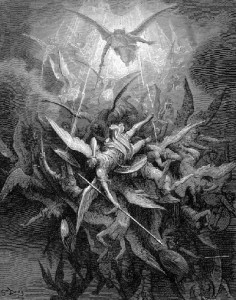Today’s essay is on how to write villains. Brief disclaimer: I do not believe I have any expertise in this, but I asked around and this is what I have been able to discover.
The key to a good villain is that he presents a good challenge to the hero.
That is it.
Many people seem to make the mistake of thinking that evil is dumb, so the bad guy should be an idiot. But when the good guy, the hero, cannot beat this idiot in the first ten pages, he, then, looks like an idiot. For the hero to look cool, he has to be able to overcome a great challenge.
That means that the villain needs to present a great challenge. Either he has to be really smart, so that the hero looks good when he outwits him, or he has to be very strong, so that the hero looks really good when he outwits him/beats him up, depending on the genre.
The other thing a good villain often has is some personal connection to the hero. Dr. Doom is Reed Richard’s (Mr. Fantastic from the Fantastic Four) college roommate. Lex Luther lost his hair due to Superman. The Joker (some versions) killed Batman’s parents. When the villain has some tie to the hero, some way of getting under his skin, that makes him more interesting to the reader.
More interesting still is when the villain is the hero gone wrong. The French guy in the Raiders of the Lost Ark is an evil Archeologist, a guy with the same talents as Indiana Jones, only he uses them for evil. Skylark’s Blackie DuQuesne is an evil super scientist. The hero, Richard Seaton, has the same skills but is bound by his sense of virtue. And then there are the old college roommates, Reed Richards and Dr. Doom again. One uses his superpowers for good, the other for awesome…er, I mean, evil. Darth Vader is what Luke could become if he would only unleash his hatred.
Sometimes the villains contrast rather than compliment the hero. Superman’s super strength and speed are countered by the vast cunning and intelligence of Lex Luther. So, a good hero/villain match-up is either complementary or contrasting—rather like a romance, oddly.
The villain can be just a great evil…like Sauron, the original Dark Lord or a horde of invading Vikings. In stories of this sort, the villain is more a representation of adversity than a personality, and the story revolves around the hero facing up to this adversity or perhaps outwitting it.
There are many other kinds of villains, but the principle is the same. The villain has to present a problem that seems impossible for the hero, and the hero has to solve it by dint of whatever quality it is that makes him our hero to begin with.
If the hero is much more impressive than the villain, the hero starts looking less impressive for having wasted his energies on someone unworthy of him.
If the villain is more impressive than the hero, you end up with the Fu Man Chu phenomena. Many people know the insidious mastermind, Fu Man Chu. Few people remember the name of the man who opposed him.
(I happen to remember it, but only because, many, many years ago, a character of mine dated him in a roleplaying game (or wanted to, my older brother would not let me, as the fellow had “no prospects.”) His name is Nayland Smith.)
I may not know much about writing good villains, but I do know a trick for writing better villains. (By “better” here, I mean better than they would have been.) On page 64 of his Writing the Breakout Novel Workbook, Donald Maass offers an exercise to help establish the motivation of one’s villains. I did this exercise for the Three Shadowed Ones in my novel and it improved them 100 fold. They are still merely mediocre villains, but they are much more interesting than they would have been without this extra work.
Basically, the point of the exercise is to make certain that your villains are three dimensional characters and that their motives have been established. As my husband (sf and fantasy writer John C. Wright) is fond of saying, everyone has a justification for what they are doing from their own point of view. If you can discover the justification, the villain often becomes more interesting.
However, beware of overdoing it. I have seen stories—especially modern ones—where the villain has been justified to such a degree that he is now a victim and not a villain at all. (The recent Grinch comes to mind. Instead of the Grinch being a grouch concern with material things and the Whos understanding the true meaning of Christmas. The Grinch is a pathetic, picked-on figure who teaches the Whos to stop being so materialistic. (I have heard that this movie was made as part of a new energy directive, a plan to harvest energy from authors and artists who are spinning in their graves. I believe it is called: Plan Eight From Outer Washington.)
So who is your favorite villain…and why?




